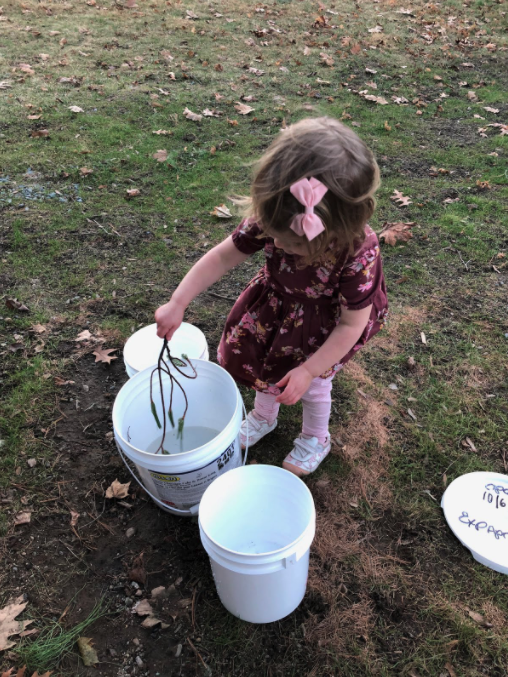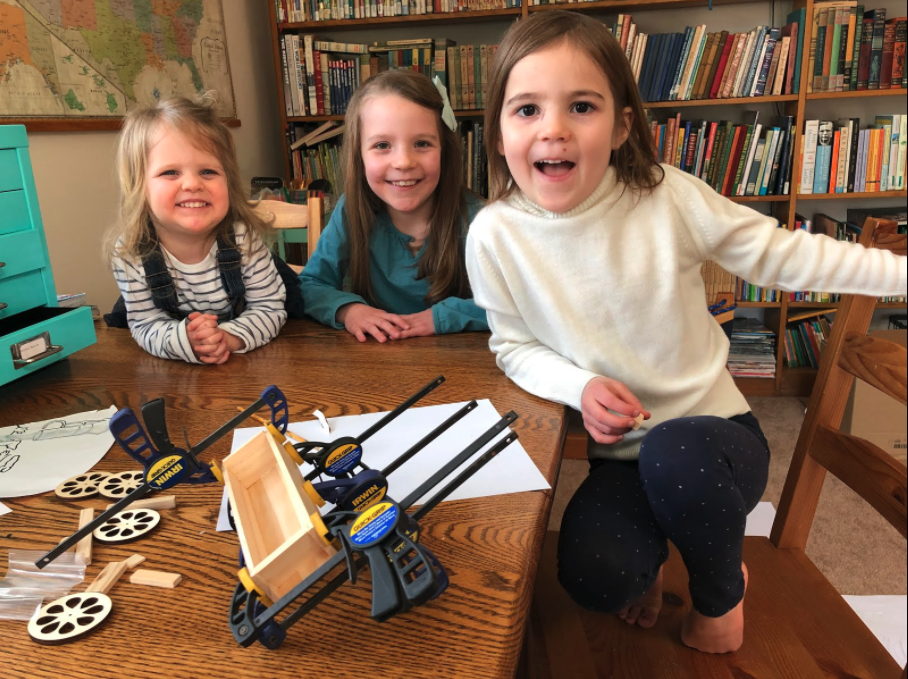Making the Most of Increased Family Time With Young Children
This article originally appears on 2006 alumna Sarah Skinner’s personal blog, acontinualfeast.com.
Schools are closed, events are canceled and parents are feeling understandably overwhelmed by the time in close quarters with their children. There are already many suggestions on the internet for occupying this time. What could I have to add? As a homeschooling mom to young children, allow me instead to subtract rather than add. You don’t need curricula, worksheets and color-blocked schedules to thrive during this time.
What works for your family may not resemble the schedules you’ve seen online. You might choose to set all that aside in favor of something far more memorable. You can use these weeks for unexpected snuggles, reading books together that will make you laugh and cry, spending time in nature together, baking favorite recipes or creating art. Here are some things we’re doing at our house that seem to be working:
1) Turn a bad day around
We all have days in which we struggle. At our house, when somebody (or everybody!) is falling apart, it’s time to go outside, turn on music or play with water. Some days it’s as simple as listening to the birds from our front porch, dancing to ballet music, running a bath or playing with measuring cups in the kitchen sink.
2) Dress like you’re going somewhere
Have your children get dressed. The allure of days at home in pajamas will wear off, and you will find that your children are more enjoyable if they are dressed and their hair is combed. Dress yourself, too; you will feel more like a human instead of a zombie surrounded by wild animals.
3) Start your day with a morning basket
This idea is not unique to me, but I recommend it highly. Into a basket put books that will help you start your morning with something meaningful. Some of our favorites include seasonal poetry—A.A. Milne poetry, a folksong or hymn we are learning together, and a book of artwork by a favorite artist. During breakfast, when the children’s mouths are full, I read to them. A Psalm, poetry, a chapter from a good book. They love it, so between sips of coffee, I keep going. Before you know it you’ve front-loaded your day with good things.
4) Read aloud (and use audiobooks)
The research is clear: Reading to your kids leads to a lifetime of loving to read. Just get started and watch their vocabularies blossom, comprehension grow and recall ability astound you. Reading aloud as a family will give you a shared family lexicon of beloved characters and stories that will become intermingled with your own family story. Don’t forget to utilize Hoopla, Libby, Audible or Librivox for audiobooks when your voice needs a break.
5) Say “yes”

Building a model covered wagon after finishing a book about the Santa Fe Trail. Sometimes it takes courage to say “yes” to, or even propose, something involving glue and hammers and small nails. Take courage; it’ll be worth it.
My kids wake up daily with hundreds of ideas. By saying yes to some of them, we can fill our days with meaningful activities. Last week, my oldest daughter wanted to sew a doll tutu. I couldn’t manage it that day due to my work schedule, but I told her, “Yes! We can absolutely do that tomorrow!” Our middle daughter saw me knitting and asked if she could create something. “Yes! Here’s a big crochet hook and yarn.”

You might even be bold enough to say “yes” to a clothing-averse toddler “helping” you make sourdough bread.
6) Utilize your little helpers
Let the kids wash veggies or fruit, slice cucumbers or apples, or spread peanut butter on bread. Young kids will love being part of the meal preparation process, and they’re more likely to take ownership and enjoy a meal if they’ve helped prepare it.
7) Quiet time—for them and for you
We all need down time. Maybe everyone goes to his or her own space, or maybe a few children listen to an audiobook together. However it looks in your family, during quiet time, you are not responsible for entertainment. Read your own book, work on your own project, or lay down and take a well-deserved nap. Say to your children, “Go play quietly,” and see what they come up with. Before you know it half the recycling bin will be emptied, the scissors and tape will have gone missing, and your kids will have constructed something fantastic.
8) Teach your children to tidy up
This way of life, with kids in your home doing interesting things, is a messy one. You might lose your mind if you don’t help them learn to clean up. These skills won’t come overnight but they will gradually grow, and your future self will thank you for building these habits.
9) Keep notebooks together
Need an afternoon activity? Consider helping your kids begin notebooks to reflect on things they’ve read or done during this period of time. They will enjoy adding to them now and looking back on them later. My older kids keep both a nature journal and a book of illustrations. The nature journals contain watercolors and drawings of nature discoveries. The books of illustrations contain drawings related to books we’ve read for school or fun. They treasure these notebooks and love looking back at their work, remembering the stories and discoveries we’ve shared.
10) Embrace a regular bedtime
Spending the day with your kids is different from spending the day apart and needing evening hours to reconnect. We put our three-year-old to bed by 7 p.m.; the older girls get ready at the same time. Then the older girls can look at books or listen to music in bed from about 7:30 until they’re ready to sleep. Meanwhile, I go recharge and get ready to do it all again the next day.
+ + +
These are a few ways to enjoy these days at home, to connect with your children while their lives are turned upside-down, and to watch them grow, learn and thrive. Your kids probably won’t remember a specific subject at the end of this unusual time. What they will remember is the time at home with their family—which may yet turn out to be unexpectedly wonderful.
You can read more of Sarah’s writing at www.acontinualfeast.com where she blogs very sporadically about her life as a musician and a mom. Sarah Skinner ’06 is a violinist and teacher as well as a homeschooling mother residing in Danvers, MA. Her husband, Nathan ’07, is the director of music at Boston’s Park Street Church. Together, Sarah and Nathan seek to embrace the chaos that comes with having young children (ages 8, 6, 3 and due this month), and Sarah adds to the usual noise around the house by teaching their children to play the violin.
 The Bell
The Bell